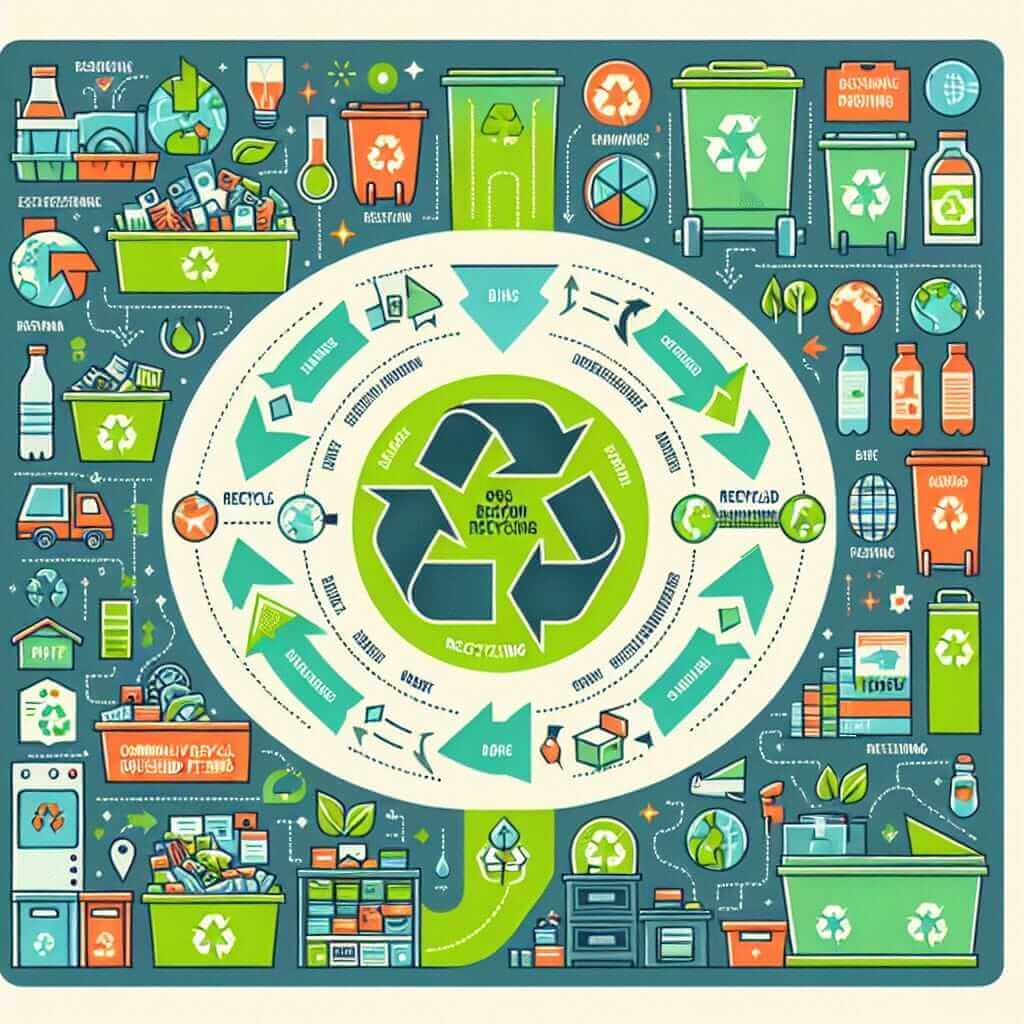The topic of recycling programs and their benefits frequently surfaces in IELTS Writing Task 2 essays. These questions typically assess your ability to discuss environmental issues, analyze advantages, and present a well-structured argument.
Here are a few examples of how this topic might be presented in the exam:
- Some people argue that recycling programs are ineffective and unnecessary, while others believe they are crucial for protecting the environment. Discuss both views and give your own opinion.
- What are the main benefits of recycling? To what extent do the advantages of recycling outweigh the disadvantages?
- Many governments are investing heavily in recycling programs. However, some people believe these resources would be better spent on other environmental initiatives. Discuss both views and give your own opinion.
Sample Essay: Recycling Programs and Their Advantages
Let’s delve into a sample essay based on the first prompt mentioned above:
Some people argue that recycling programs are ineffective and unnecessary, while others believe they are crucial for protecting the environment. Discuss both views and give your own opinion.
Essay Analysis
This essay question presents a classic “discuss both views” structure. To effectively address this type of prompt, you must:
- Present both sides: Clearly articulate the arguments for and against the effectiveness of recycling programs.
- Provide your opinion: State your stance on the issue, indicating whether you believe recycling is essential or not.
- Support your arguments: Back up your claims with relevant examples, evidence, and logical reasoning.
Model Essay
Recycling, a cornerstone of modern waste management, has sparked considerable debate regarding its true efficacy in protecting our planet. While some individuals deem recycling programs futile and dispensable, others staunchly advocate their indispensable role in environmental preservation. This essay will delve into both perspectives before culminating in my personal viewpoint.
Critics of recycling programs often highlight their inherent inefficiencies. They argue that the complex sorting processes, coupled with contamination from improperly cleaned materials, render a significant portion of recyclable waste unfit for processing. Moreover, the transportation of recyclables over long distances to specialized facilities generates a substantial carbon footprint, further diminishing the environmental benefits. In some instances, the cost of collecting, sorting, and processing recyclable materials can outweigh the economic gains from reusing them, leading to financial burdens on municipalities.
Conversely, proponents of recycling emphasize its undeniable contribution to environmental sustainability. By diverting waste from landfills, recycling conserves valuable natural resources, reduces greenhouse gas emissions associated with manufacturing new products from raw materials, and mitigates the pollution of land, air, and water. Furthermore, recycling fosters job creation within the recycling industry and promotes a circular economy that minimizes waste generation. The sense of environmental responsibility instilled through community recycling programs can also translate into broader eco-conscious behaviors.

In my view, despite the valid concerns regarding the efficiency and cost-effectiveness of recycling programs, their overall benefits for the environment and society far outweigh the drawbacks. By investing in advanced sorting technologies, promoting public awareness about proper recycling practices, and implementing policies that incentivize the use of recycled materials, we can enhance the efficacy and sustainability of recycling initiatives.
Word Count: 297
Writing Tips
- Use topic-specific vocabulary: Incorporate terms like “landfills,” “carbon footprint,” “circular economy,” and “eco-conscious” to demonstrate your understanding of the topic.
- Present a balanced argument: Acknowledge both sides of the issue even if you have a strong opinion.
- Use cohesive devices: Employ linking words and phrases like “moreover,” “conversely,” “furthermore,” and “in my view” to ensure a smooth flow of ideas.
Vocabulary
- Efficacy (noun) /ˈefəkəsi/: the ability to produce a desired or intended result.
- Futile (adjective) /ˈfjuːtaɪl/: incapable of producing any useful result; pointless.
- Indispensable (adjective) /ˌɪndɪˈspensəbl/: absolutely necessary.
- Staunchly (adverb) /ˈstɔːntʃli/: in a very loyal and committed manner.
- Culminating in (verb phrase): reach a climax or point of highest development in.
- Inherent (adjective) /ɪnˈhɪərənt/: existing in something as a permanent, essential, or characteristic attribute.
- Mitigate (verb) /ˈmɪtɪɡeɪt/: make (something bad) less severe, serious, or painful.
- Incentivize (verb) /ɪnˈsɛntɪvaɪz/: motivate or encourage (someone) to do something; provide a stimulus to.
Conclusion
Mastering the art of writing about recycling programs is crucial for success in the IELTS Writing Task 2. By understanding the various facets of this topic, familiarizing yourself with relevant vocabulary, and practicing your essay-writing skills, you can confidently approach any question related to recycling and the environment. Remember to practice writing essays on similar topics, such as renewable energy, sustainable living, and climate change, to broaden your understanding and vocabulary within the realm of environmental issues.